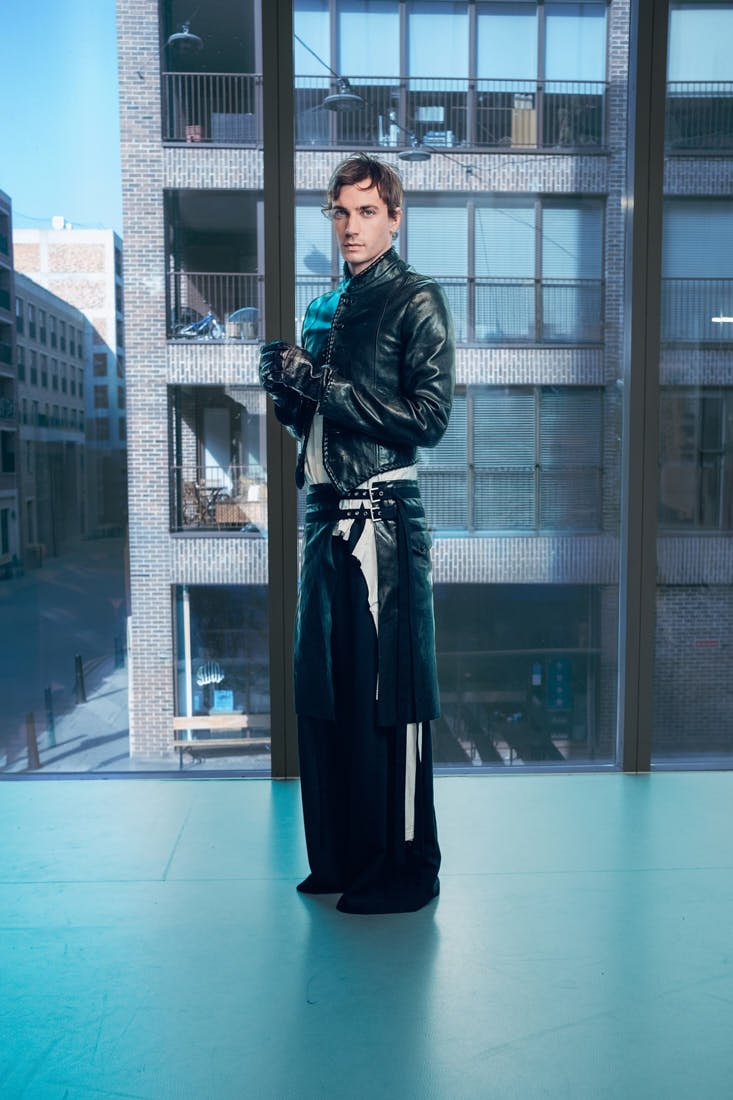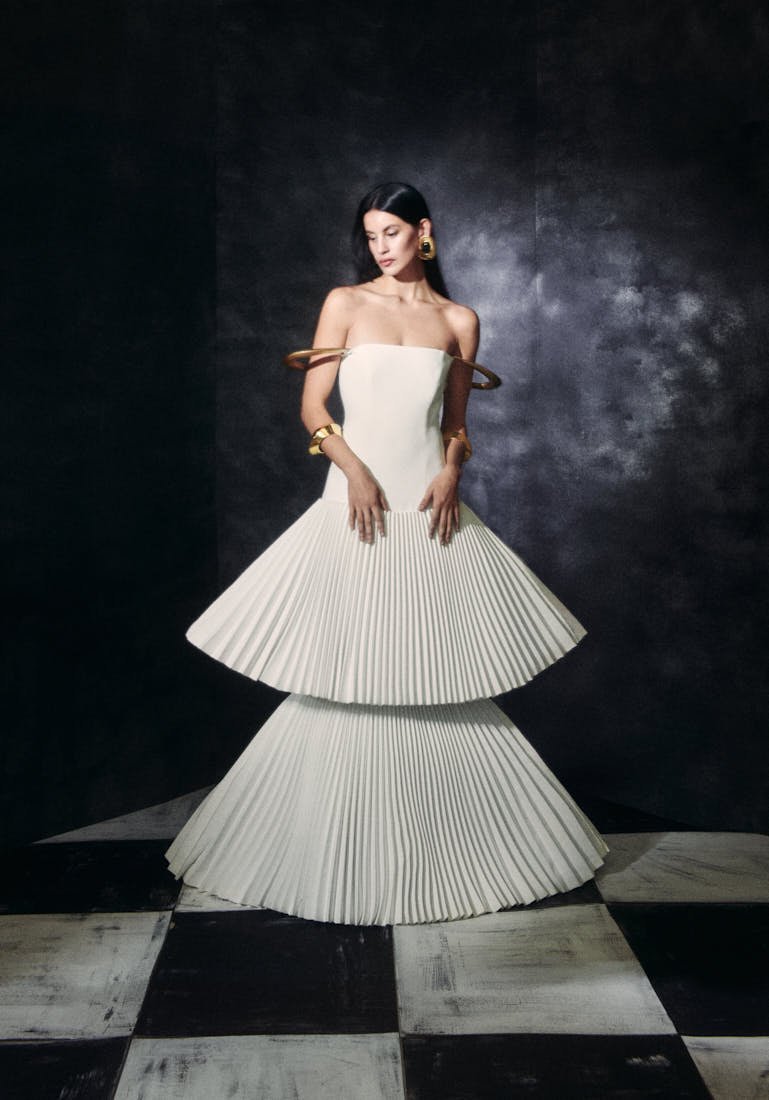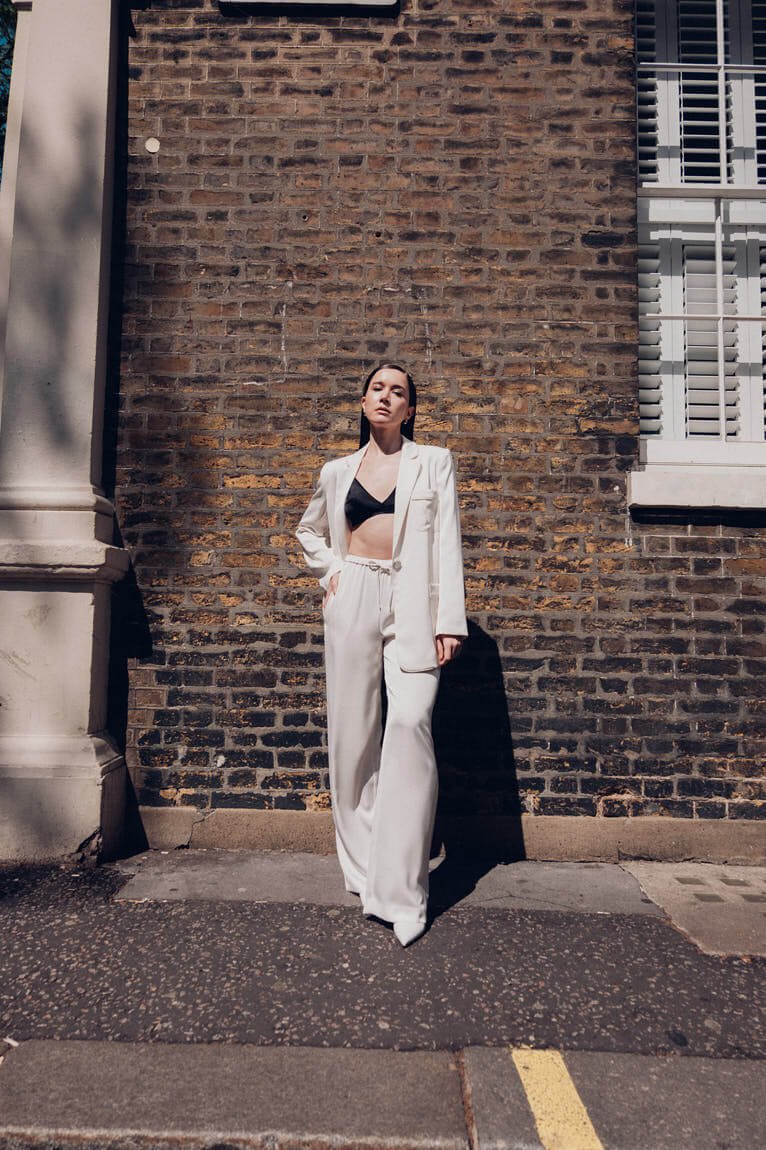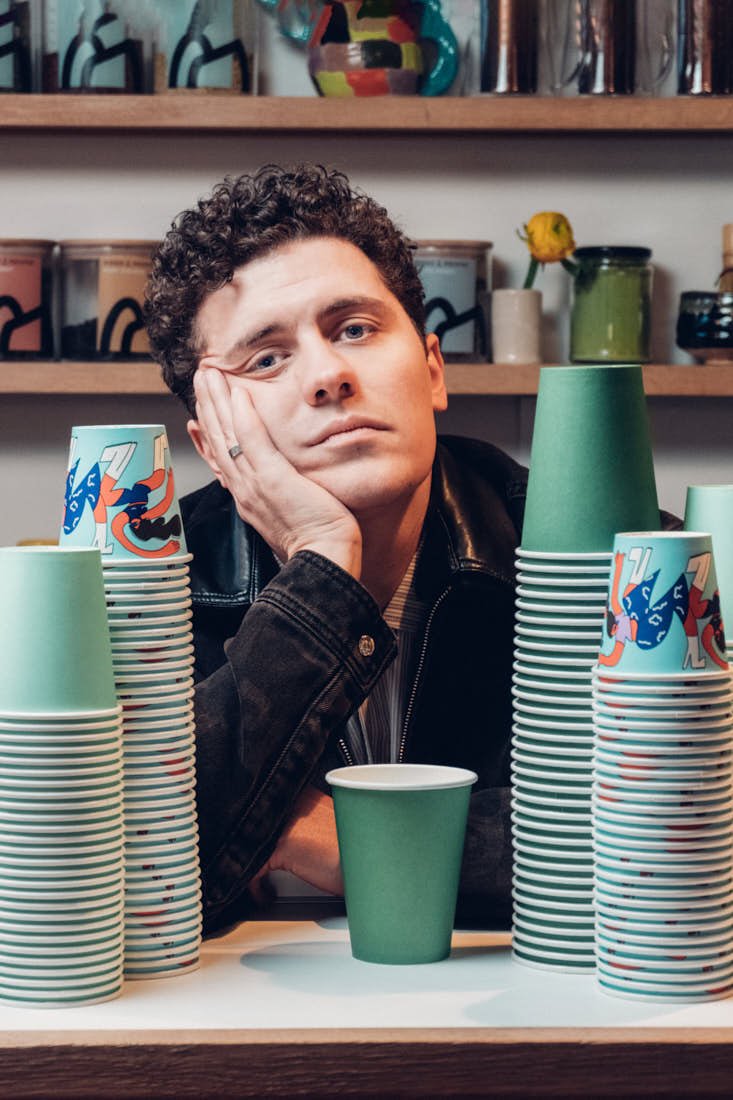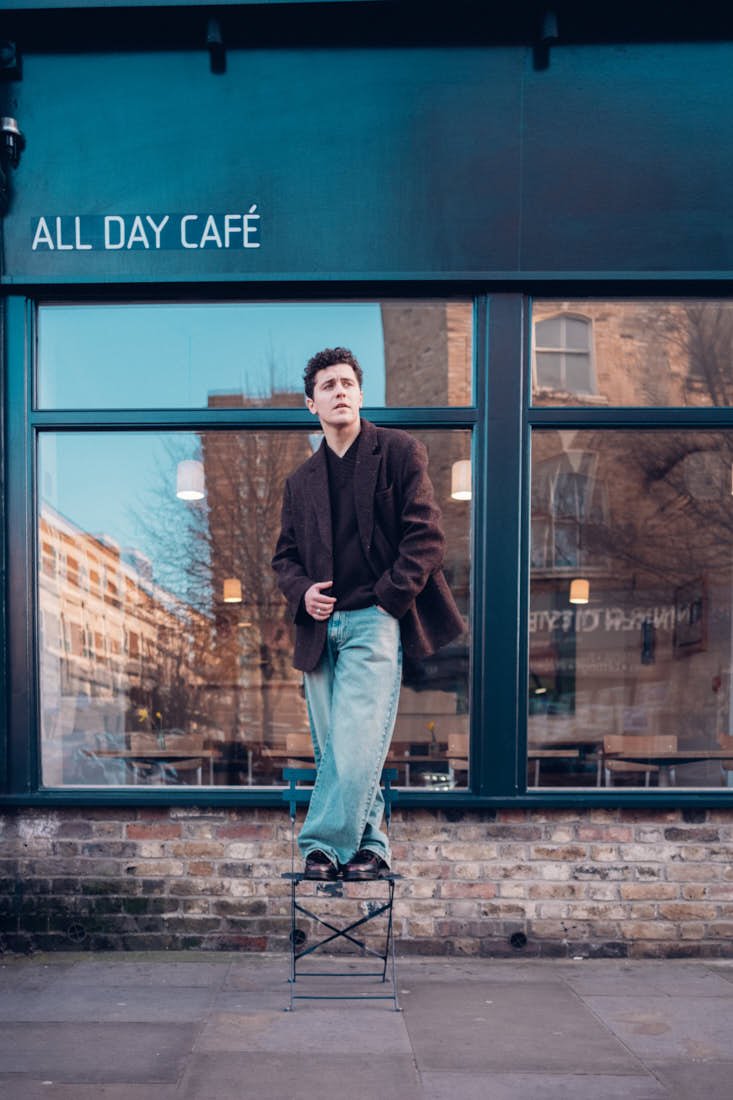ANA POLVOROSA
*The Threads Are Still Moving
written + interview Alban E. Smajli
You see some actors once and that’s it — you’re in. Like a crush or a weird fever. You follow them through all their stuff, even the bad stuff, like they’re a cousin you sort of invented.
Then there’s the other kind — the shapeshifters. The ones who never show up the same way twice, who make you feel like you're watching them for the first time every time. Ana Polvorosa? She's that second kind. A glitch in the system. She’ll do twisted comedy, ghosts, heartbreak, mystery — whatever.
She folds roles inside out and wears them like borrowed jackets. Now she’s back, or sideways, or upside down, in Last Night at Tremore Beach, a Netflix storm-drenched, genre-melting thing, directed by Oriol Paulo and co-starring Javier Rey. And yes, she’s done it again, of course she has. What did you expect?
total look DIOR
Juan Marti
Ana, how have you experienced the days following the release of your new series, The Last Night at Tremore Beach?
Ana Polvorosa
Honestly, it's been a lovely few weeks. Many colleagues and dear friends have watched the series and left very positive comments. They're saying they really enjoy it and appreciate the work that went into it. So, overall, I'm really happy.
I’ve also watched the series, and I found it very intense. I have to admit that there are some things I think I didn’t quite understand …
Don’t worry. In the end, it’s a series that, precisely because it has so much to unpack and unravel, leaves room for many different viewpoints and ways to interpret it. This is due to how the story is told and what the series is like in itself. So really, don’t worry about that.
How did this project come to you?
Oriol Paulo, the director, got in touch with me and told me he’d written a story that was going to be adapted into a series format. He sent me the scripts and mentioned it was an adaptation of Miquel Santiago’s novel. He asked me to read them and share my opinion. I read the scripts and found the story fascinating on all levels, very… I don’t know, spectacular, impressive. What also caught my attention was how Oriol wanted to approach it, the perspective he wanted to give it. In short, there are many things, but what really connected me to the project was the character of Judy.
The series has a very complex plot, did you understand it during the first reading of the script?
Well, you obviously have to read it and reread it. Even then, there’s something in the story that makes you think way beyond what’s immediately apparent. But, for my taste, that’s what makes it interesting. It’s one of those stories that leaves you in a kind of limbo, like: “Is it telling me what I think it’s telling me, or is it really telling something else?” And that’s fine too, because it gives the viewer the chance and freedom to draw their own conclusions or have their own point of view.
Sometimes I feel like we’re too used to being given the answers instead of being allowed to ponder a bit …
I think right now we’re in a moment where we’re driven by a wave of action and reaction, quick responses, things made easier, so we don’t have to think too much or get stuck in universes that make us reflect or that allow room for different opinions. And it’s true that stories like this, at least, give us the opportunity for personal reflection and the chance to draw our own conclusions.
A story with so many plot twists and where the characters are not who they say they are must be quite a challenge as an actress. To what extent do you really need to understand what happens to your character?
It really depends, I think, on each project, each story, and where you are at the moment. It also depends on the colleagues you have, who is directing, and the vision they want to give it, how you feel with the character, or how you approach it. I think there are a lot of factors that influence how you approach all of that. At least, that’s been my experience. Maybe what I’m trying to say with this is that, in some cases, I start creating or connecting with the character from a more intuitive or sensory place, depending on how I live through the moment.
Did you discover Judy’s truths from the beginning, or did you keep being surprised by each script?
In this case, there was a previous novel that you could read or not. Then you have scripts to base yourself on, which are the ones you’re going to work with. Those scripts are written as they are, and you understand them as you read them. I mean, the way the information about the character comes to you is similar to how you later see the episodes.
You must have had many surprises!
In this series, the characters develop as the story progresses. I think that’s one of the hallmarks of the show, something that's really well done. I think Oriol has done this in other works and other stories as well—he often focuses on episodes that center more on certain characters, to delve a little deeper into their backgrounds. In this case, for example, you can see it in episode four or five, where the characters' past lives, traumas, or lived moments are explored. These elements continue to affect them, and in the end, it's not so important to know a character's pastto tell their present, but it certainly helps to understand them better.
As a viewer, do you like these kinds of series that make things easier for the audience?
Like everything in life, it depends on the moment you’re in. As a viewer, there are times when I feel like I want the story to be a little more complex, where I’m suddenly surprised or given something more "unusual." And other times, I prefer simpler stories, without flashbacks or unexpected twists, that are told from beginning to end, depending on how I’m feeling at that moment.
The series presents certain terrifyingly supernatural nuances. I think there are a lot of prejudices in the industry toward the horror genre, especially toward supernatural horror. How do you feel about these kinds of stories?
I think, in the end, what matters is that there’s some kind of relatively coherent justification, you know what I mean? Although, many times, I also like things that are... more "crazy" ideas, even if they’re a bit inexplicable. I don’t know, I think it’s not so much about wondering if a story has supernatural themes or something like that, because I’m not entirely sure what you mean by that. But I imagine you're referring to things that are more inexplicable, or stories that go beyond the ordinary. In the end, I think I focus more on the story itself, on what it wants to tell, what kind of story it is, rather than the twists or the themes it might explore or where it’s heading.
I love talking about supernatural experiences with my friends.
I don’t really pay much attention to those things (laughs).
Have you never experienced something supernatural?
Not that I’m aware of! Though I might have experienced something and just not realized it.
One of the things I liked most about the series was its foggy, menacing atmosphere. It’s a town that invites mystery …
I found the story attractive, and it also seemed like a great opportunity to work with Oriol. I’ve seen some of his previous works, and there are things I really liked. So, I saw this as a wonderful opportunity: to work with him, develop this character, and be part of this story. I don’t focus so much on whether the settings are more aesthetic or even more "flashy."
total look BIMBA Y LOLA
trench TERESA HELBIG
tights CALZEDONIA
shoes VERSACE
“Acting makes you evolve professionally, as an artist, as a creative, but also personally, a lot. You grow, you delve into other places, you mature, you learn.”
Ana Polvorosa speaks with Juan Marti
for LE MILE Issue 38 / Ephemeral Edition SS25
total look VERSACE
Are you a fan of mystery movies?
I think, initially, I’m interested in any kind of story. It’s true that, perhaps, mystery attracts me a bit more, but horror, not so much, actually. I don’t know, because then it’s true that sometimes I watch horror movies and think, "Hmm, I liked that." I’m not sure if, as a viewer, I usually focus on this type of story, but there are some films in this genre that I’ve enjoyed.
Would you like to work with horror filmmakers like Jaume Balagueró or Paco Plaza?
Why not? I’ll repeat a bit of what I mentioned before: within whatever genre it is, what really attracts me is the story itself. If there’s something in the story that connects with me, if the character touches me, and everything that the story encompasses, then yes, I’m interested. It’s not so much about the genre, but about what the story conveys to me.
Tell me about a piece of fiction that has touched you recently.
It’s true that right now I’m a bit disconnected, but what I’ve been able to do lately is read more. Look, I’m going to mention a book I just finished. I’ll tell you the author exactly because I finished it the other day, and I read it super fast. You know, those books that just grab you. I went to the bookstore to buy other books I needed, and suddenly I saw this one, The Vegetarian, and it caught my attention. It was written by Han Kang, the winner of the Nobel Prize in Literature this year, 2024. And, wow, it really disturbed me a lot. In fact, I read it very quickly, but that’s because it hooked me so much. What’s curious is that, when I finished it, I was really shaken. I mean, it affected me quite a bit. It’s a very disturbing novel, but at the same time, I find it fascinating. I got trapped in such dark and eerie worlds that… I don’t know, it was a strange feeling. Kind of in line with this more mysterious and dark genre.
I’m curious about what you did during your free time on the set of Last Night at Tremore Beach.
The truth is that, you know, during shooting periods, when I’m immersed in a project, I find it quite difficult to disconnect during the process. Well, I do disconnect, obviously, because when the shoot is over, I go home and have time for myself, but it’s true that I’m so immersed in the universe of the story… I don’t know, I tend to stay focused on the work, looking at the scenes for the next day or reviewing what I have coming up the following week. Sometimes, I even go back to check what we filmed the previous week to try to improve details. I’m really focused on all of that. As for disconnecting, well, the most we did was go out for dinner or make plans with the crew, because since we were shooting outside of Madrid, in Asturias and Barcelona, we formed a really close bond. Sometimes we’d step out of the characters’ bubble, but honestly, I didn’t do much to disconnect. I was very caught up in the universe of the story.
Isn’t it exhausting to get so involved at that level in your projects?
When it’s shoots like this, that deal with more delicate themes or, well, when the shoots are complicated, they inevitably affect you. There’s something you’re experiencing firsthand, and those complex themes, in some way, stay with you—in your body, in your mind.
How was the return to your life after a shoot like this?
Well, in this case, since the shoot was so long, and also intense, with a lot of commitment and responsibility, the excessive duration of the project added to it. Afterward, I needed some time to readjust to my daily life and routines. I mean, I had to normalize my life again, pick up my habits. I needed a period of time to settle back in because I was completely in another place, in a different context.
I guess it must involve a lot of personal work?
Yes, there’s a lot of personal work involved as well. It’s part of the process. For me, being quite reflective, I like to go over the moments I went through during the shoot, because in the end, that’s what leaves you with the learning, in some way. How have you evolved? Because shoots are incredible experiences. Acting, in itself, makes you evolve professionally, as an artist, as a creative, but also personally, a lot. You grow, you delve into other places, you mature, you learn. They are very powerful journeys.
What have you discovered about yourself during the shoot of Last Night at TremoreBeach?
Well, I’m still discovering myself. That’s not something that ends at the end of the shoot. It’s not like you finish shooting and say, "That’s it, I’ve got it all figured out." In fact, it’s been a year since we wrapped the shoot, in October or November of last year, and I’m still thinking and reflecting on many moments from the shoot. I’m still reaching conclusions about what it has taught me. So, I think it’s not something immediate, it’s not about finishing and knowing everything right away.
After this experience, don't you feel like doing something more naive and silly?
With stories, when they come to you, I think there has to be a connection, both with the story and with the character. When you read the scripts or when you get the casting calls, there has to be something that hooks you, something that makes you feel connected. Because if not, it doesn’t make much sense. I’m not sure if it’s something intuitive or sensory, I’m not sure how to call it, but it’s that feeling of reading the script and thinking: "Wow! Here’s something on an energetic level, something that connects with me and excites me." I don’t know, I think it depends on that, regardless of whether it’s comedy, drama, tragicomedy, theater, film, or television.
Are you an actress who is guided more by your head or your heart?
There’s a part of me that’s inevitable, a very passionate side, both with life and with my profession. That part is there, and it’s beautiful, I love it because I think it brings very intense things. But, of course, there are also moments when you have to stop, reason, think, and weigh things out. I don’t know, I think there’s a balance between both parts, depending on the moment.
What are you craving as an actress right now?
I think, precisely, what we were talking about earlier, about evolution, learning, and growth… I believe that stories come to you that move you from within, that make you say, "I want to dive into this, I want to explore it, I want to understand what this is, how I approach it, from what place I do it." It’s a continuous learning process, in the end. And that’s one of the most beautiful things about this profession, because you never stop learning, and at the same time, you never stop getting to know yourself.
suit BIMBA Y LOLA
earrings SUOT STUDIO
shoes VERSACE
total look ZIMMERMANN
talent ANA POLVOROSA
photographer DANNIEL ROJAS
stylist SERGI PADIAL
make up + hair MIGUEL ANGEL TRAGACETE for CHANEL BEAUTY + KEVIN MURPHY SPAIN
producer JULIA NAVARRO via SUNSEASANDS AGENCY
words JUAN MARTI
photo assistant JAVIER BLANCO
stylist assistant PAULA SÁNCHEZ
special thanks ESPACIO LA CANDELARIA + MESALA FILMS










